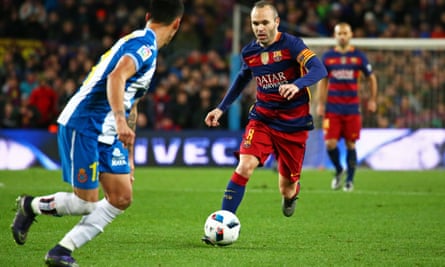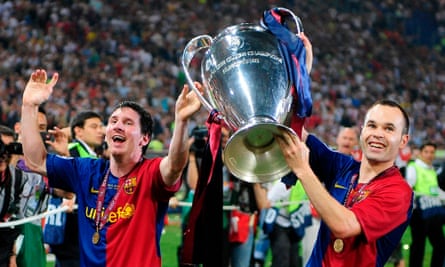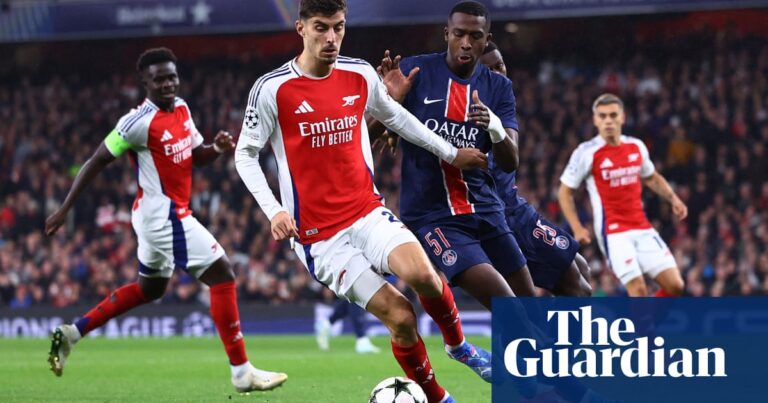“It has been like a story that starts on the playground in Fuentealbilla,” Andrés Iniesta said, and now this was The End. In the auditorium in Barcelona’s old port where he had just announced his retirement on Tuesday afternoon, there was a lot of applause, some tears and a request, delivered softly, almost apologetically, like everything he says. Could his family come down, Iniesta asked, shielding his eyes from the spotlight? And could that picture go back up? As they made for the stairs, on the screen above he appeared again, the way he was. A tiny boy, about four, in a red jumper and blue dungarees, foot on the ball.
For that boy, Iniesta said, one night in Belgium would have been enough, but there were 1,015 more of them, across 22 years. They were the best nights of his life and the lives of many others too, which is what gave them meaning, what gave all of it meaning. He was 18 when he played his first professional game, a 1-0 win at the Jan Breydelstadion in Bruges at the end of October 2002. He was 40 when he played his last, a 3-2 defeat at the Khalid Bin Mohammed Stadium in Sharjah in June 2024.

Iniesta had retreated from the elite and everything that entails, the pressure and the exposure, six years before because he wanted to leave at the right time, for them to remember him like this. That last waltz in the 2018 Copa del Rey final had been the perfect way to leave the stage; his last walk, barefoot across the Camp Nou pitch with the lights out and the stands empty, the perfect private farewell. “I would have liked to have retired there but at Barcelona you need to give 300% and that wasn’t possible,” he said here. He went instead to Kobe, Japan, and the United Arab Emirates. Now he confirmed that he will not play again, anywhere.
“I never thought I would see this day,” he said, or tried to say at the very start of an event organised to say goodbye, 500 people there, drawn to a man who never demanded anything but who meant so much that his departure demanded they be there. His voice was cracking, but it is time to let go. There will be time to come back. He would like to be a coach at the Camp Nou, just not yet: he hasn’t even done the first session, but he will. “The experience on the grass is over but I can’t be far from football, which will continue to be my life. I’m building my day after, step by step. I need to learn, make mistakes, and I’m starting my coaching course. I’m quite stubborn. I would have liked to have played until I was 90.”
The first night they left him in Barcelona, the family driving there from Fuentealbilla in an old blue Ford Orion, Iniesta couldn’t stop crying. José Bermúdez, the under-17 goalkeeper who showed him around La Masia, the farmhouse and youth team residency alongside the Camp Nou that would be his home, recalled a tiny kid, “delicate and sensitive”. At the hotel Rallye, barely 50 metres away, Iniesta’s parents were feeling no better. In the night, his father had an anxiety attack, waking up determined to go and get his son and take him back to the village. But his mum, Mari, resisted the urge to do exactly that, insisting he be given the chance.
One day, he was. “Carlos Naval called La Masia and asked for me,” Iniesta recalled here. “I was 16. Serra Ferrer wanted me to train with the [first] team. I was trembling all over. To see the Camp Nou from La Masia every day and have the chance to be there was incredible. I remember Luis Enrique waiting. I went into the dressing room and I don’t know how long it was before I even opened my mouth. Luis Enrique gave the assist for my first goal, he was my coach, we achieved big things. That symbolises that path of a boy who played in all the youth teams and reached the first team.”
Pep Guardiola was there, too. He had seen Iniesta play before. “Remember this day, the day you first played with Andrés,” he told teammates. In the first few days of Guardiola’s time as coach at Barcelona, when they had been beaten by tiny Numancia and had drawn to Racing Santander, when it seemed everyone thought employing him was a terrible mistake and that they should have signed José Mourinho instead, there was a knock on his door. Iniesta had come to tell him something: to trust in himself, that it would be all right. That weekend they won 6-0 in Gijón; by the end of the season, they had won the treble – two of the 35 trophies Iniesta won.

Guardiola famously told Xavi: “You’re going to retire me. This lad is going to retire us all.” Now he has retired himself, a quarter of a century on. Between his first game and the last, there were 885 club matches, 131 for Spain. Two stood out more than any other, defined by two goals, which were never what defined him: Stamford Bridge, when he brought a baby boom, and Johannesburg, when he always said he heard the silence and waited for Newton. Gravity would bring the ball to him, and then he would win Spain the 2010 World Cup. There was no one better to do so, no one so universally admired or embraced. They would have chosen him if they could.
after newsletter promotion
“Imagine the chances of someone from Fuentealbilla making it,” Iniesta said. Fuentealbilla’s population is 2,071, the village that conquered the world. He took off his Spain shirt to reveal the vest he wore in honour of Dani Jarque, the Espanyol defender who had passed away. It was everyone’s goal, he said, and he was everyone’s: not least because he meant it when he said that and he played like he meant it, too. Few footballers had so little ego, fewer were this talented. He was genuine, an everyman. He had suffered too, a vulnerability there: he had, he revealed, been in a dark place before the World Cup, a kind of depression, “victim of something that terrified me”.
All of Spain held on to Iniesta as something good and letting go felt like releasing something deeper, a different time. The loss at his retirement, the celebration of his career, even six years after he left the country and 14 since he scored in the 116th minute of the World Cup final, was collective. And not just because of that World Cup final, because of all if it, because of him. He described that moment here as “celestial”, and that felt like the right word too, one to fit that moment and all the other moments: something angelic about it, about him. His is a career that is not so much a collection of hits as a piece of music, soaring and gliding and carrying you. It was the way he played and the way he was. And it was shared.
“There have been many moments but what I most feel is the affection and the love from people,” he said. “The pride I talk about isn’t because of the trophies, it is because I fulfilled my dream and made lots of people happy.”
Source: theguardian.com



















